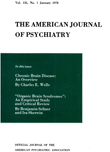THE SYMPTOM OR CHARACTER TRAIT MAY BECOME "ORGANIC"
Abstract
Occasionally a symptom or character trait may not change during an otherwise successful course of psychotherapy. It is postulated that this may result from the development of a multitude of intrapsychic associations, learned patterns of behavior, and at the organ level many nerve fiber synaptic connections between nerve cells and between neural systems which form an organic basis for the character trait or symptom. Prolonged therapy may nevertheless be successful in these "organic conditions through the patient's establishing new adaptational modes of behavior as a result of the ability of the human nerve cells to form new cellular processes. This development of nerve fibers occurs most rapidly in early childhood and there may be a second period of rapid growth in adolescence.
Access content
To read the fulltext, please use one of the options below to sign in or purchase access.- Personal login
- Institutional Login
- Sign in via OpenAthens
- Register for access
-
Please login/register if you wish to pair your device and check access availability.
Not a subscriber?
PsychiatryOnline subscription options offer access to the DSM-5 library, books, journals, CME, and patient resources. This all-in-one virtual library provides psychiatrists and mental health professionals with key resources for diagnosis, treatment, research, and professional development.
Need more help? PsychiatryOnline Customer Service may be reached by emailing [email protected] or by calling 800-368-5777 (in the U.S.) or 703-907-7322 (outside the U.S.).



